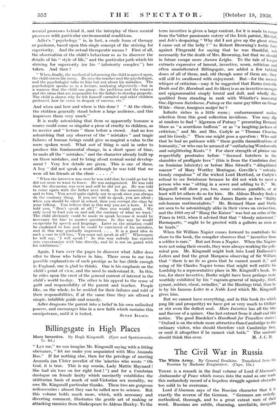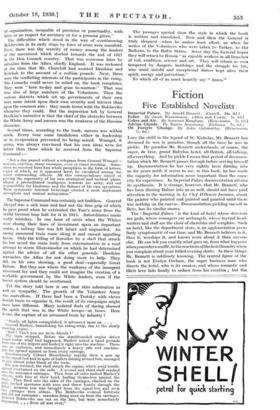The Civil War in Russia
The White Army. By General Denikine. Translated from tho Russian by Madame Zvegintstov. (Cape. 15s.) TIIERE is a remark in the final volume of Lord d'Abernon's Ambassador of Peace which comes into the mind as one reads this melancholy record of a hopeless struggle against obstacles too solid to be overcome.
Lord d'Abernon says of the Russian character that it is exactly the reverse of the German. " Germans are orderly, methodical, thorough, and to a great extent men of their word. Russians are subtle, charming, unreliable, incapable of organization, incapable of precision or punctuality, with little or no respect for accuracy or for a promise given."
The difficulties which stood in the way of overthrowing Bolshevism in its early stage by force of arms were manifold. First, there was the scarcity of money among the leaders of the movement which started towards the end of 1917 in the Don Cossack country. That was overcome later by subsidies from the Allies, chiefly England. It was reckoned at the time that Mr. Churchill had assisted Denikine and liolchak to the amount of a million pounds. Next, there were the conflicting interests of the participants in the rising. The Cossacks could never be relied on, the book complains. They were " here to-day and gone to-morrow." That was true also of large numbers of the Volunteers. Then the various districts which set up governments of their own were more intent upon their own security and interest than upon the common aim : they made terms with the Bolsheviks whenever they could. But the impression left by General Denikine's narrative is that the chief of the obstacles between the White Army and success was the 'weakness of the Russian character.
Several times, according to the book, success was within reach. Every time some breakdown either in leadership or in co-operation prevented its being seized. Wrangel, it seems, was always convinced that his own ideas were far better than those which he received from the Supreme Command Not a day passed without a telegram from General Wrangel-- nervous, exacting, sharp messages, even at times insulting. Some- times we received from him whole pamphlets in the form of letters, copies of which, as it appeared later, he circulated among the senior commanding officers. All this correspondence aimed at proving the superiority of his own strategical and tactical plans, alleged a premeditated negligence towards his army, and our responsibility for hindrance and the failures of his own operations. These systematic internal bickerings created a most unpleasant atmosphere and mutual antagonism."
The Supreme Command was certainly not faultless. General Alexyef was a sick man and had not the firm grip of which he gave proof when he extricated the Tsar's army from the skilful German trap laid for it in 1915. Subordinates made costly mistakes. In one hour of crisis when the Whites were dosing their lines of investment upon an important centre, a railway line was left intact and unguarded. An enemy armoured train came along it and caused appalling havoc. Only the killing of Kornilov by a shell that struck his but saved the main body from extermination in a mad attempt to storm Ekaterinodar on which he had determined against the advice of all the other generals. Denikine reproaches the Allies for not doing more to help. They did, on his own showing, a good deal—especially Great Britain. But they saw where the weakness of the insurgent movement lay and they could not imagine the creation of a workable government by the White leaders, even if the Soviet system should be overturned.
Yet the story told here is one that stirs admiration as well as sympathy. The growth of the Volunteer Army was marvellous. If there had been a Trotsky with clever Jewish brain to organize it, the result of its campaigns might have been different. Many isolated feats of daring showed the spirit that was in the White troops—at times. Here is one, the capture of an armoured train by infantry
"Slowly, all lights extinguished, it advanced upon us. . . . General Markov, brandishing his riding-whip, ran to the slowly crawling engine. ' Halt ! Can't you see we're friends ? ' The train stopped. Before the dumbfounded engine driver could realize what had happened, Markov seized a hand grenade from one of the snipers and hurled it right into the machine. There ass an explosion, and immediately a heavy rifle and machine- gun fire opened against us from every carriage. Simultaneously Colonel Mionchinsky rapidly drew a gun up to the signal-box and in spite of bullets raining around him, managed to aim almost point-blank at the train.
The gun boomed, the shell struck the engine, which amid terrific uproar overturned on the rails. A second and third shell crashed into the armoured carriages. Then from all sides rushed Markov's officers, with him at their head, hurling themselves against the train. They fired into the sides of the carriages, climbed on the roof, hacked apertures with axes and threw bombs through the holes ; resinous tow was brought from the signal-box and soon two carriages were ablaze. The Bolsheviks evinced fortitude and did not surrender ' • ceaseless firing went on from the carriages. Isolated Bolsheviks ran out on the line, but were immediately
bayoneted. , Soon all was overs'i
The passages quoted show the style in which the book is written and translated. Now and then the General is truly eloquent—when he makes least effort, as when he writes of the Volunteers who were taken to Turkey, to the Balkans, to the Baltic States. Some day the General hopes they will return to Russia "as capable workers in all branches of toil, erudition, science and art. They will return as men tempered by dangers, hardships and the struggle for life, who amid untold and exceptional duress kept alive their spirit, energy and patriotism."
To which all of us must heartily say " Amen."

























































 Previous page
Previous page